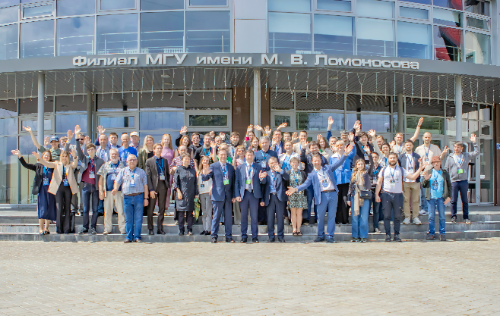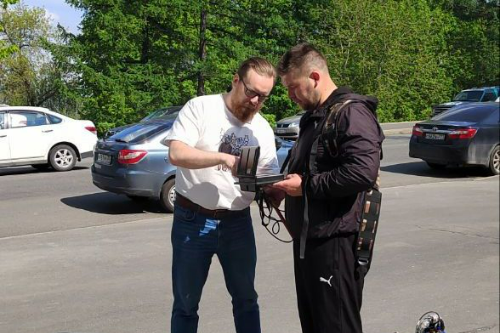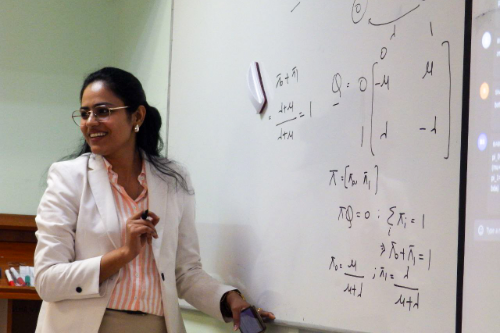Participants of the 7th International Conference “Greater Eurasia: national and civilizational aspects of development and cooperation” represent the scientific and educational community, NGOs, and authorities. The conference is organized by the RAS Scientific Council on Integrated Issues of Eurasian Economic Integration, Modernization, Competitiveness and Sustainable Development, Russian National Committee on BRICS Research, University of World Civilizations, Eurasian Information and Analytical Consortium, and other organizations.
On November 27, the strategizing session “On implementation of the BRICS+ Environmental Platform megaproject” was held at the National Committee on BRICS Research. One of the session’s facilitators was Olga Bakhmet, Corresponding Academician, KarRC RAS Director General, member of the Scientific Council of the National Committee on BRICS Research.
In her talk, Olga Bakhmet presented the prospects for regional scientific cooperation within the framework of the BRICS Green Agenda, which targets sustainable development of mankind in all spheres of life. Among other things, it implies the introduction of green technologies into the economic, social and political development of countries.
Since 2022, the Karelian Research Center RAS and the Russian National Committee on BRICS Research have been bound by a cooperation agreement. At the same time, interactions with colleagues from BRICS member countries have been going on for many years. Thus, specialists from the Institute of Applied Mathematical Research KarRC RAS cooperate with organizations in India and China in stochastic modeling, game theory, mathematical optimization, etc. The Institute of Geology develops international relations with India, China and South Africa in the study of geodynamic processes of the early Earth.
On November 25, a KarRC RAS delegation returned from China, where areas for cooperation with the Nanjing Institute of Geography and Limnology and the Institute of Soil Science CAS were discussed. Memorandums of Understanding are going to be signed with the Institute of Geographic Sciences and Natural Resources Research and the Tibetan Plateau Research Institute.
– BRICS+ regional science cooperation can promote science diplomacy and strengthen ties between our countries, – noted Olga Bakhmet.
According to her, the most promising options include intensification of cooperation between regional scientific centers from Russia and BRICS+ countries, arranging programs for young scientists, broader involvement of BRICS experts in the discussion of green agenda and sustainable development issues, using joint research to popularize science, and holding seminars to share experience and best practices with researchers from new BRICS+ members.
KarRC RAS is already working on some of these tasks. In 2023 and 2024, the Center hosted international conferences focused on environmental and nature management issues. The resolution of this year's conference proposes to set up a unified center for the development of regional (including network) BRICS+ cooperation and to establish a branch of the National Committee on BRICS Research at KarRC RAS.
Among the promising areas of regional scientific cooperation within the Green Agenda framework, Olga Bakhmet named low-carbon development and circular economy, industrial ecology and mitigation of natural disasters, sound nature management, monitoring of terrestrial and aquatic ecosystems, biodiversity conservation, as well as Arctic and Antarctic research. Karelian scientists already have research experience in many of these topics.
International
News

November 29, 2024
Prospects for regional scientific cooperation within the BRICS Green Agenda framework were presented by Olga Bakhmet, Corresponding Academician, KarRC RAS Director General, at the International Conference “Greater Eurasia: national and civilizational aspects of development and cooperation”, which is taking place in Moscow on November 27-29.
See also:

September 19, 2025
Researchers from BRICS+ countries network to study human-altered ecosystems
Studies of human-altered ecosystems were the key theme of the international webinar organized by the Karelian Research Centre RAS for scientists from Russia, India, China, and Belarus. Researchers shared expertise on the application of modern approaches and the results of their work, and agreed to create an expert network for further interactions.
Studies of human-altered ecosystems were the key theme of the international webinar organized by the Karelian Research Centre RAS for scientists from Russia, India, China, and Belarus. Researchers shared expertise on the application of modern approaches and the results of their work, and agreed to create an expert network for further interactions.

July 10, 2025
International School “Interaction of Hydrogen Isotopes with Structural Materials” was held at the National Center for Physics and Mathematics in Sarov, Novgorod Region. Karelian scientists gave a lecture and presentations on computational materials science – an efficient tool for rescaling test-sample experimental data to real-life power reactor structures.

June 6, 2025
Study trip to KarRC RAS helps specialist from Vitebsk master new electrical resistivity imaging techniques, with applications in construction
Cooperation of Karelian Research Center RAS with Vitebsk State University continues. On June 5, the University's Master's student Dmitry Lysov completed his practical training course. The construction industry specialist studied the geophysical methods used by researchers at KarRC RAS.
Cooperation of Karelian Research Center RAS with Vitebsk State University continues. On June 5, the University's Master's student Dmitry Lysov completed his practical training course. The construction industry specialist studied the geophysical methods used by researchers at KarRC RAS.

June 5, 2025
Scientists from India and Russia lecture on mathematical modeling of communication systems at IAMR KarRC RAS
Institute of Applied Mathematical Research KarRC RAS is hosting a set of lectures of stochastic modeling of telecommunication systems. Scholars from the Indian Institute of Technology Delhi (IIT-Delhi) are appearing before young scientists from Russia and India as invited professors.
Institute of Applied Mathematical Research KarRC RAS is hosting a set of lectures of stochastic modeling of telecommunication systems. Scholars from the Indian Institute of Technology Delhi (IIT-Delhi) are appearing before young scientists from Russia and India as invited professors.




